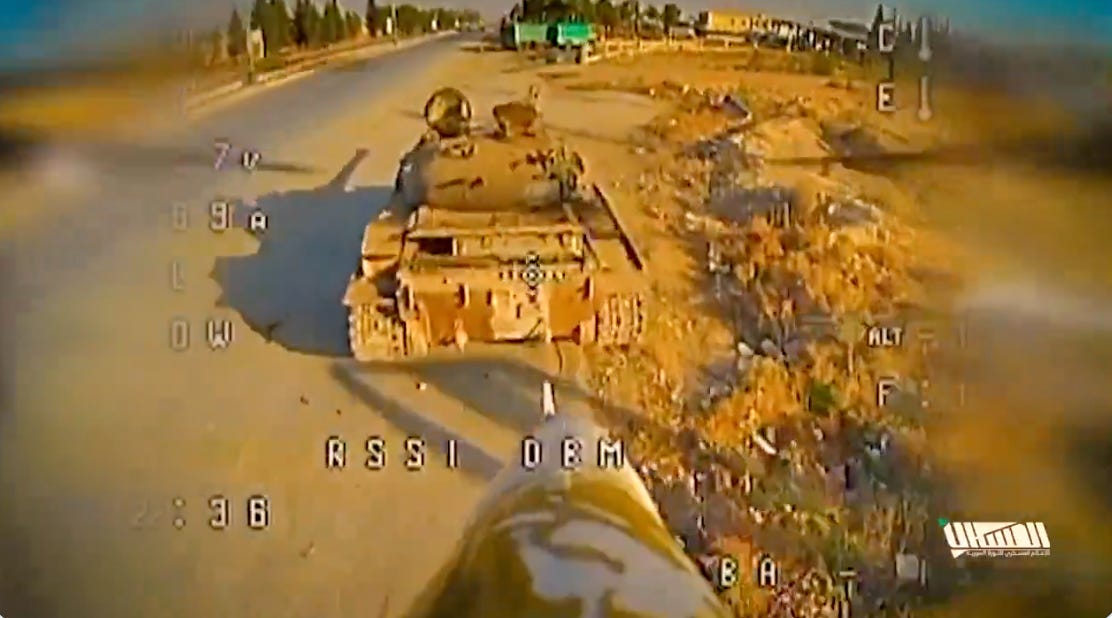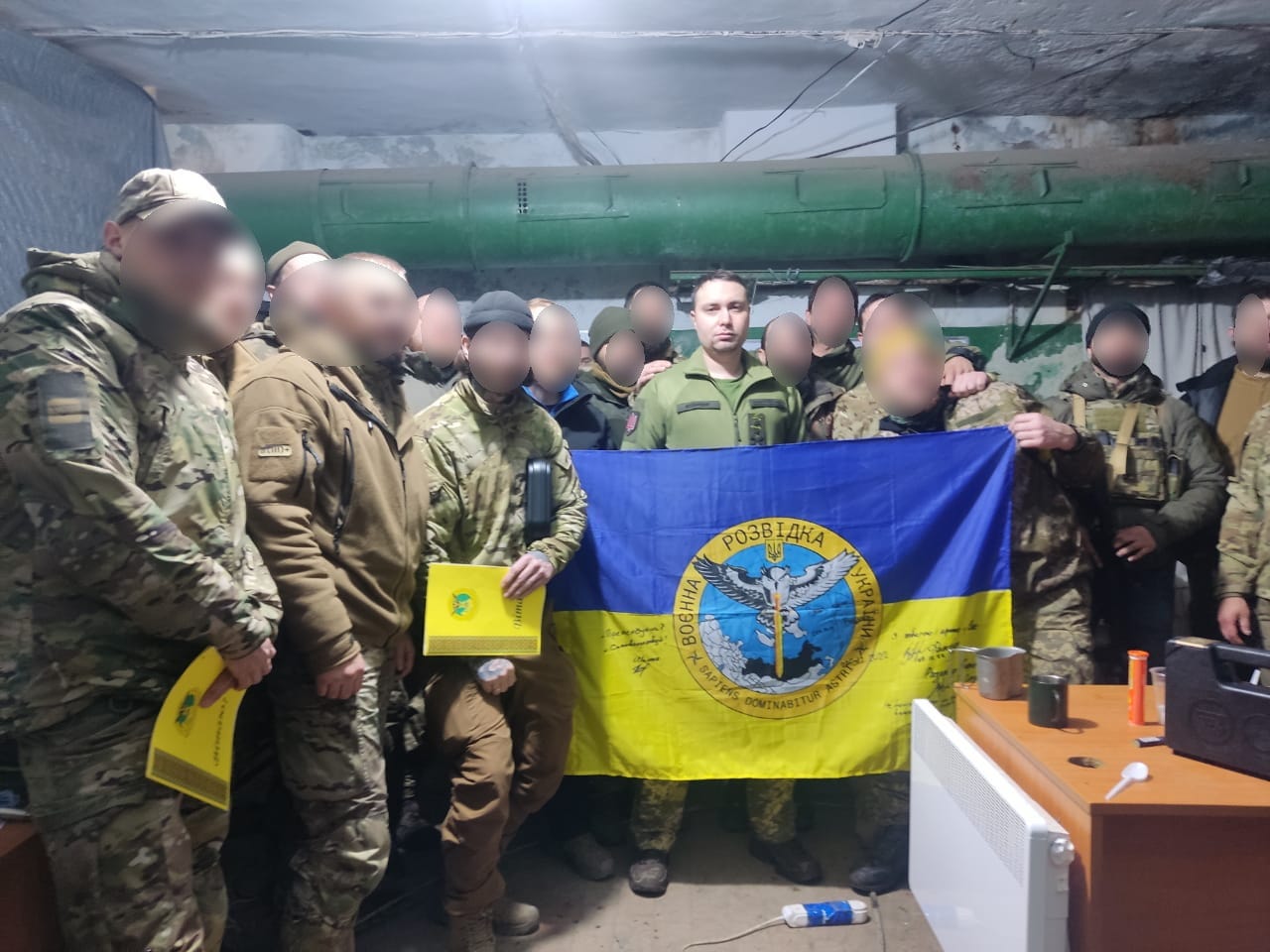Why Aleppo Matters for Ukraine
Despite Russia's claims, Ukraine isn't behind the new rebel offensive in Syria. But it has much to gain from a rebel victory against Bashar al-Assad.

When battlefield videos from the Syrian rebels’ lightning campaign against Aleppo emerged last week, there was one thing nearly all military analysts immediately noted — the ubiquitous use of drones. The UAV capabilities of Hay’at Tahrir al-Sham (HTS), the Islamist rebel group that led the charge on Aleppo, had apparently advanced rapidly over the last few years, with videos showing first-person view (FPV) drones being deployed against Bashar al-Assad’s Syrian Arab Army to deadly effect.
The Syrian rebels have used drones for years, but what these videos showed was a sophisticated adaptation of drone tactics that uncannily mirrored how the Armed Forces of Ukraine have used “suicide drones” on the battlefield against Russia since 2022. Aside from the decidedly Levantine environment, videos of such drones striking Assad regime tanks during HTS’s subsequent advance on the Syrian city of Hama this weekend closely resembled videos that have poured out of Ukraine for almost three years. Drones have become so important for HTS’ war effort in fact that the group recently created its first dedicated drone unit, the Shaheen Brigade.

Despite lots of speculation online — and Russian claims at the UN this week that Ukraine was responsible for the Aleppo campaign — Ukrainian forces were likely not directly involved in HTS’s assault on the city. But there is plenty of evidence to suggest that Ukrainian intelligence has had a hand in the Syrian conflict this year, tipping the scales every so often against Assad’s ally Russia and in favor of the Syrian rebels in a way that very well may have contributed to their recent success.
Ukraine isn’t interested in playing any kind of serious role in the conflict against Assad — but as both the war in Ukraine and the war in Syria become increasingly globalized, it is no secret that the two conflicts have become inextricably linked, and Ukraine certainly recognizes this. Ukrainian military and intelligence leaders have long understood that any pressure applied to Russia’s axis of influence in the Middle East and Africa will have inevitable repercussions in Eastern Europe and on the home front in Ukraine. What this means is that Ukraine may find the ultimate resolution of its war with Russia linked in part to the Syrian theater — especially as figures like Trump, Putin, and Turkey’s Erdoğan seek to use the Ukraine-Russia negotiations to carve out grand bargains that will benefit them in their own respective spheres of influence.
According to the Kyiv Post, citing claims on Islamist media sites, Ukraine’s Main Intelligence Director (HUR) has trained certain rebel groups in northwestern Syria and itself carried out attacks on Russian bases near Aleppo and in southern Syria since March of this year. The special forces unit involved, the so-called Khimik group, reportedly trained rebel troops in tactics Ukraine has used throughout the Russo-Ukrainian War, notably its innovative use of drones.

This should come as no surprise to anyone watching the spillover of the war in Ukraine beyond its borders — Ukrainian forces have actively worked to undermine Russian troops and its mercenaries like the Wagner Group in Sudan and Mali as well, in pursuit of HUR chief Kyrylo Budanov’s famous 2023 edict that Ukraine would hunt down Russian forces wherever in the world they might be. Syria, however, is different. Before the start of Russia’s full-scale invasion of Ukraine, its involvement in Syria was its most significant overseas military engagement, the first signal that it was capable of projecting power and influence well beyond its near-abroad into strategic corridors in the Middle East. Making Assad dependent on Russia not only strengthened Moscow’s hand in the region by providing it with a direct link to Iran, but also gave it a foothold on the Mediterranean Sea via its naval base in the Syrian coastal city of Tartus.
For Ukraine, the ongoing rebel offensive against Assad serves its interests chiefly because it is stretching Russian forces thin and forcing its military hierarchy to make difficult decisions about its investments in the Ukrainian and Syrian theaters. HTS and its allies have already come into direct conflict with Russian forces around Aleppo, and their continued push southward toward Hama puts them within striking distance of Tartus and Russia’s air base at Hmeimim. Russia will no longer be able to rest on its laurels in Syria as it had since 2022, and has now been forced to ramp up its air campaign against the rebels in response — but having transferred many of its air assets at Hmeimim to Ukraine, it has had to rely on older aircraft to carry out its latest raids against rebel-held areas. Alongside this air campaign, the Kremlin has vowed to support Assad’s forces during the current offensive, but its actions on the ground have suggested it has other intentions — the Institute for the Study of War reported yesterday that Russia has begun evacuating its navy from the Tartus base, indicating it fears the port may soon be targeted by rebel forces and that it likely won’t commit additional ground troops to the fight in Syria. The HUR’s claim yesterday that Russia is set to deploy its Africa Corps, the remnant of the Wagner Group, to Syria instead of its regular forces adds further credence to this notion.
After expending so much blood and treasure on Syria since 2015, the fact that Russia is reluctant to meaningfully counter the most significant threat to its ally Assad’s regime in nearly 10 years shows just how overextended the Russian military has become in 2024. Even on its home front in Kursk Oblast, where Ukrainian forces have been occupying Russian territory for four months now, Russia has been unable to dislodge the Ukrainians despite the assistance of tens of thousands of North Korean soldiers. Its woes in the area have been further amplified after the US and the UK gave Kyiv their blessing to use long-range American and British missiles against Russian territory, which resulted in a slew of North Korean casualties last week.
Within such an environment, the potential collapse of the Syrian regime would be a massive reputational and strategic blow to Russia, and would work in Ukraine’s favor at a critical moment ahead of likely peace negotiations under Donald Trump’s auspices. Not only would Russia appear weaker on the world stage if it abandoned Assad in his moment of need, but with its position in the country threatened, actors like Turkey may smell blood in the water and use Ukraine to press Russia to its advantage. Turkey has backed certain rebel groups in Syria for years and maintained a military occupation of parts of the country’s north, all while playing Ukraine and Russia against each other since 2022 in order to position itself as a mediator in the conflict. With Putin and Assad weakened in Syria, Turkey may sense an opportunity to use its own influence in Syria as a bargaining chip for concessions from Russia in the Black Sea, where Turkey has competed with Moscow for decades. While Turkey is not necessarily Ukraine’s most stalwart ally and has plenty of economic incentives to cooperate with Moscow, it is also certainly not in Turkey’s interest to embolden Russia at the expense of its own economic and energy interests in the Middle East and the post-Soviet space.
But even beyond such concrete geopolitical calculations, a loss in Syria would palpably diminish Russia’s status as a great power, which could give Ukraine’s Zelensky a wider range of options at the negotiating table. Syria may not save Ukraine from a disastrous deal to end the conflict, but Kyiv needs all the help it can get, whether it comes from Western allies or from the Middle East. It’s possible that Putin may well decide to recommit to Syria, judging it too great a prize to lose — but in doing so, he will have to put his already shaky position in places like Kursk at risk. Even that calculation alone would work in Ukraine’s interest, and would justify the HUR’s work in Aleppo and beyond.



